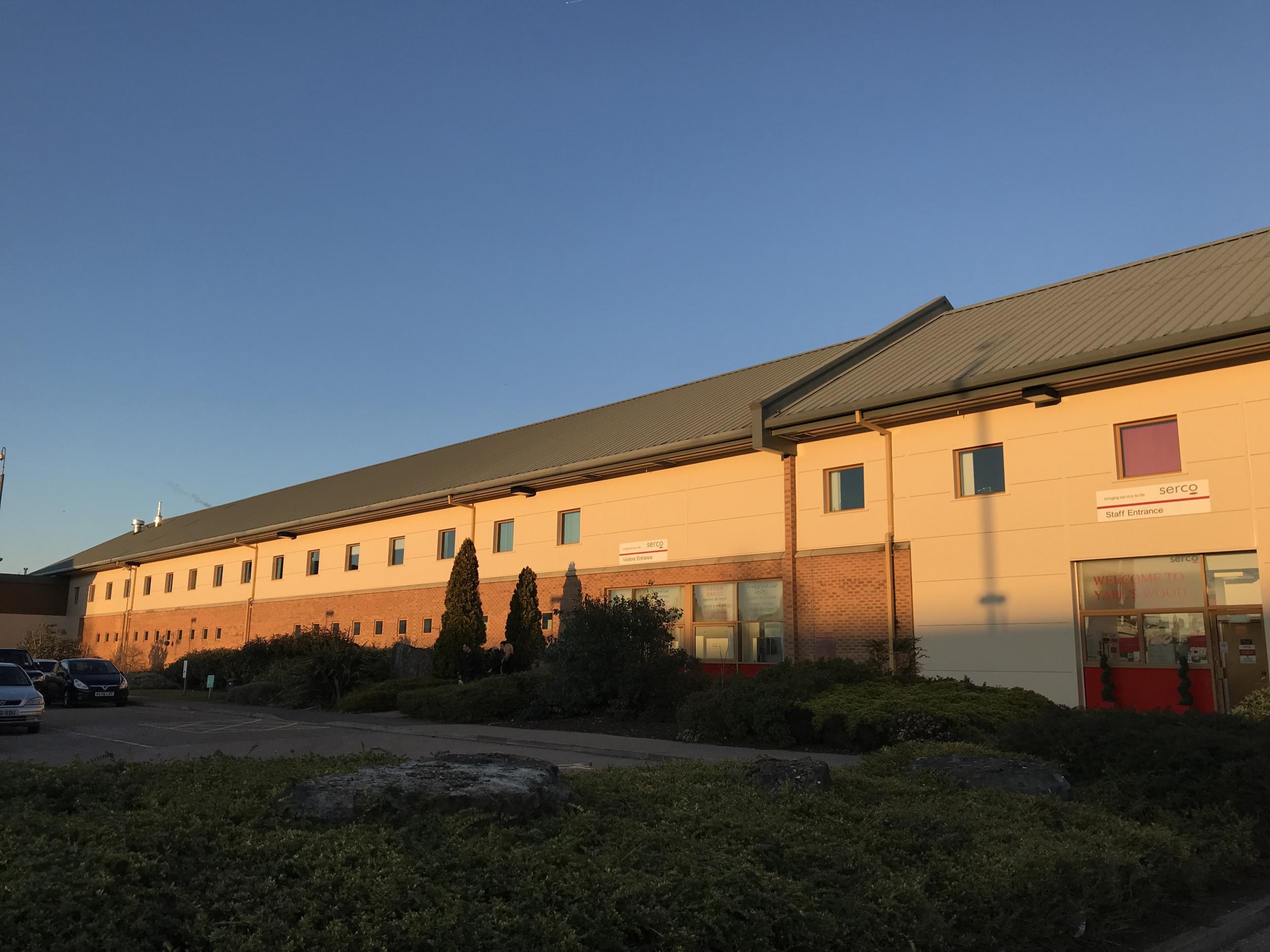Yarl's Wood: Inside the crisis-hit immigration detention centre
As residents go on hunger strike against poor conditions, The Independent enters the detention centre as a visitor and meets a woman who, locked up despite being in the UK since she was 13, describes a restrictive and at times 'inhumane' regime

Your support helps us to tell the story
From reproductive rights to climate change to Big Tech, The Independent is on the ground when the story is developing. Whether it's investigating the financials of Elon Musk's pro-Trump PAC or producing our latest documentary, 'The A Word', which shines a light on the American women fighting for reproductive rights, we know how important it is to parse out the facts from the messaging.
At such a critical moment in US history, we need reporters on the ground. Your donation allows us to keep sending journalists to speak to both sides of the story.
The Independent is trusted by Americans across the entire political spectrum. And unlike many other quality news outlets, we choose not to lock Americans out of our reporting and analysis with paywalls. We believe quality journalism should be available to everyone, paid for by those who can afford it.
Your support makes all the difference.“Place your index finger here,” says the receptionist as she nods to the fingerprint scanner on the welcome desk emblazoned with the word “Serco”.
“And the other hand. Now stand with your back to the wall for a photo.”
This is just the beginning of a long series of security checks for anyone visiting Yarl’s Wood Immigration Removal Centre. Next you have to bundle all your belongings into a locker, including phones. Then you wait outside a large door next to an unwelcoming sign ordering: “Wait your turn”. Beside it are warnings about all the things residents are “not allowed” to take into the centre: money, phones, food.
Eventually you get ushered into a small room where you find yourself walking through a full body scanner. A sign on the door states in capital letters: “No residents beyond this point”. Once you’ve undergone a full body search and have a green band wrapped around your wrist, you’re finally able to step into the visiting room.
On first glance, it’s a room of people chatting at tables and children playing with toys in a corner. But on closer look, you have a dismal scene of loved ones trying to treasure the few hours they have together before they are forced apart again. A downcast Filipino woman rests her head on her partner’s shoulder as he strokes her arm. A West African mother dotes on her young son in the children’s area. All appear to be plagued by the fear that they could suddenly be seas apart.
Yarl’s Wood holds more than 400 people, mainly women, to establish their identities or facilitate immigration claims – not because they have committed criminal offences. I’m visiting the centre days after detainees began a hunger strike in protest against poor conditions. I’m here as a visitor, not a journalist. While I am unable to access the rooms or main living area, it is clear from what I see and hear why residents are striking.

Opelo Kgari, 27, is the woman I’m there to meet. She has been in Yarl’s Wood for five weeks, and is one of the 120 detainees on hunger strike. It is quickly clear from the way she speaks and her ease of communication that she is very much British. It’s not a surprise. She came to the UK from Botswana with her mother when she was just 13 years old.
But despite going through the British education system, achieving good A-levels and developing aspirations to work in the UK’s charity sector, Opelo has been thrown into Yarl’s Wood twice in the past year. The first time, last May, she had been on her way back from a short weekend in Belfast with friends when she was placed in a holding cell for two days – a memory that brings tears to her eyes – before being driven to the centre. The second time, she had been reporting to the Home Office as she is required to do every two weeks. Again, she was locked in a holding cell for more than 12 hours and then taken straight to detention with only what she had on her back.
“This time round, I wasn’t even wearing a bra,” Opelo exclaims. “I was going to yoga with a friend after reporting to the Home Office, so I just threw a coat on. I never got to the class. They put me and my mum in a holding cell for over 12 hours, with three officers outside. My mum was just crying. We were taken to Yarl’s Wood at around 3am. I didn’t have a bra for five days once I got here, or a change of underwear.”
She and her mother, who she lives with in Stoke-on-Trent, have been fighting their right to be in Britain since 2010. Their asylum claim has been rejected a number of times, and they are now in the process of arguing that, after living in the UK for 14 years, throughout Opelo’s formative years, they have a human right to remain. Yet despite ongoing legal proceedings, they find themselves locked in Yarl’s Wood.

Opelo wears a navy sweater of which the sleeves reach just past her elbows. “It’s cold in there,” she says, rubbing her bare lower arms. “I don’t have any of my warm clothes.” Her friends have been gradually delivering her clothes to the centre, but they can only check in so many at a time and they have to go through a strict vetting process, which can take several days. Opelo explains that some detainees have no way of getting their belongings from home once they’re here. “Some women have to wear the horrible tracksuits we’re provided with. They’re a dirty grey and they’re not warm.”
Asked what she has had to miss out on while being in detention, Opelo is strikingly frank and matter-of-fact. She explains that she was unable to attend a friend’s funeral recently because they thought she would “do a runner”, and that she had to forego a major conference where she was supposed to represent the charity she volunteers for. After a big sigh, she says she also misses the simple things, like Earl Grey tea, Spotify and the ability to walk around without shoes on – all of which are prohibited in Yarl’s Wood.
But her main concern is of her fellow detainees who are more vulnerable, who she says are not having their health needs met: ”There’s one woman who spends all day walking around the centre with a packed handbag, claiming she had everything she needs in there. She’s clearly not well. And there’s an Iranian woman who’s on suicide watch. Officers just sit outside her cell with the door open. She clearly shouldn’t be in here at all. It’s inhumane.
“There’s also a man whose teeth are so bad they’re falling out, but he’s been waiting a long time to see the dentist. Bizarrely, I’ve managed to get an appointment before him, even though he’s been waiting much longer. There’s a lack of organisation.”
Opelo believes the problems stem from much higher than the staff at the centre. “Most of the staff here are decent people. They are doing their jobs. They do what they can to make it bearable for people,” she says. “The problem comes from the wider system which puts people in here and then releases them, but gets no further in the process.”
Being in Yarl’s Wood isn’t what Opelo imagined for herself when she was growing up. She enjoyed school and did well academically, passing A-levels in English, Geography and IT. It wasn’t until she applied for an undergraduate degree at the University of West England and got rejected due to her immigration status that she realised something was wrong.
Nearly ten years on, despite throwing herself into volunteering and charity work because she was unable to go to university or get a proper job, Opelo feels her life is on hold.
“There are days when it’s really hard and I feel like I have no future. I struggle to sleep. The idea of going back to Botswana is unfathomable. I was never close to my family there and I don’t even speak the language. I spent my formative years here in Britain. I couldn’t recognise myself as a non-Brit now.”
The hunger strike and the recent visit to the centre by Shadow Home Secretary Diane Abbott has raised hopes for her and others being held in the centre that things will change. But as things stand, Opelo will continue to be locked up despite a flourishing start to her life in Britain, mentally ill women and men will continue to be detained without necessary support and the crisis of Britain’s limitless immigration detention system will remain.
A Home Office spokesperson said: “Detention and removal of those with no lawful basis to stay in the UK are essential parts of effective immigration controls. We do not detain individuals indefinitely – when people are detained, it is for the minimum time possible and detention is reviewed on a regular basis.
“Any decision to maintain detention is made on a case by case basis but the detainee’s welfare remains of the utmost importance throughout. The provision of 24-hour, seven-days-a-week healthcare in all immigration removal centres ensures that individuals held there have ready access to medical professionals and levels of primary care in line with individuals in the community.”